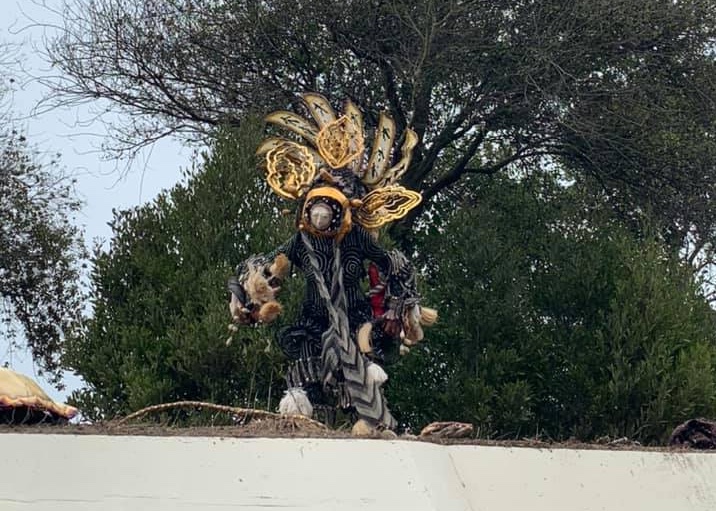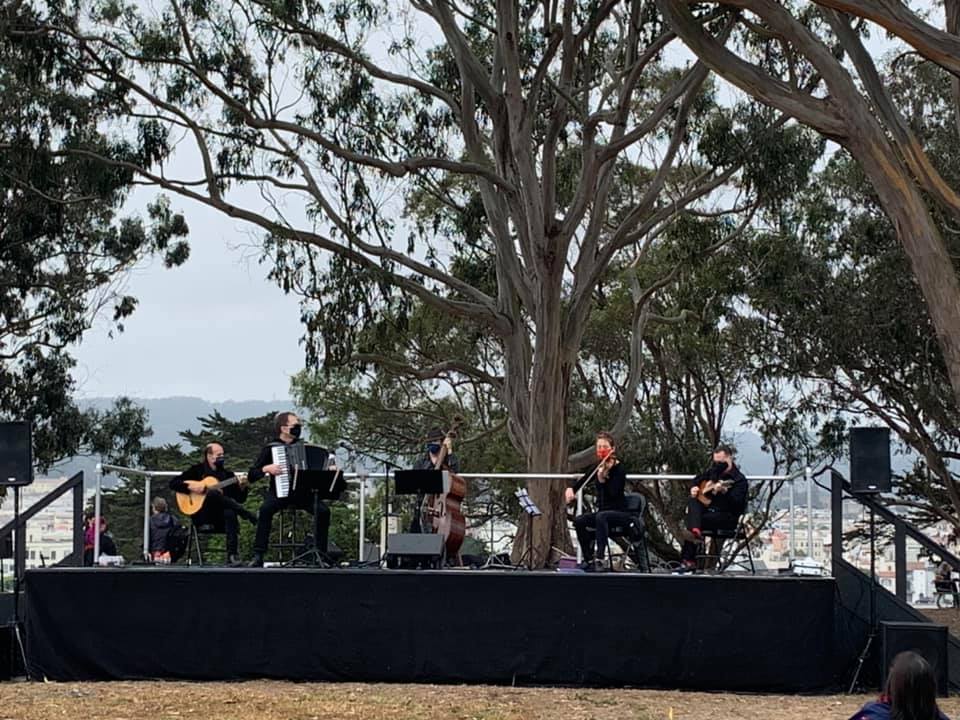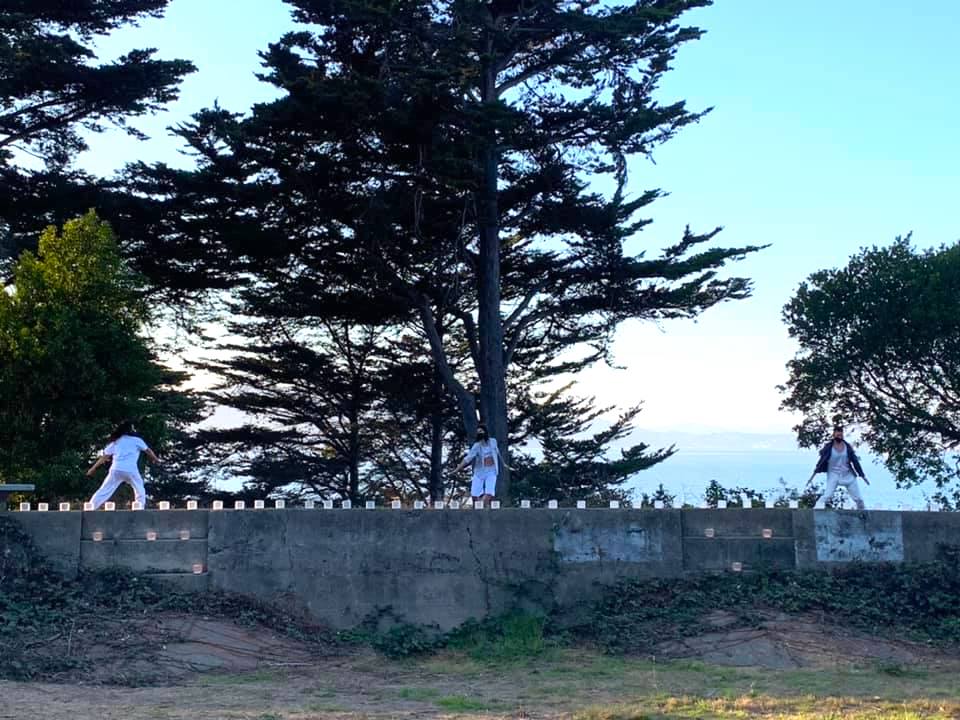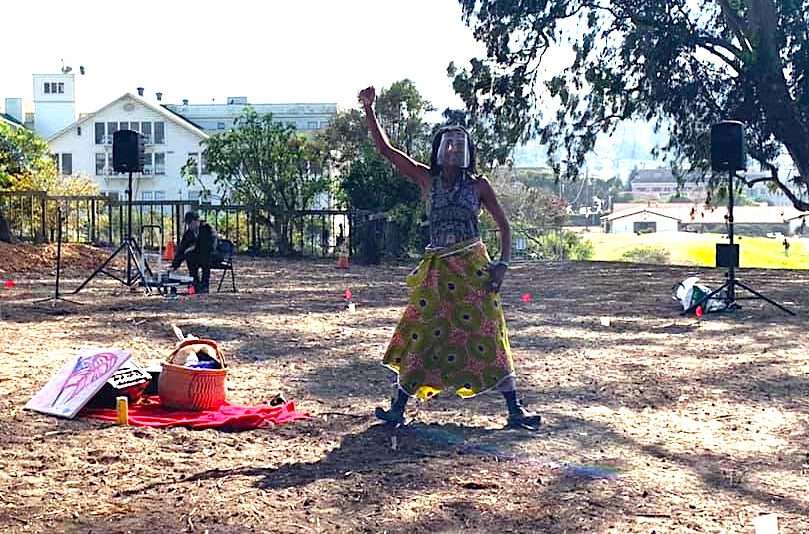The city has announced that indoor theater concerts, and performances can resume April 15 at very limited capacity. The state is finally issuing advance guidelines so venues can plan ahead for reopening. And already people are looking back on a Year There Was No Art.
But in fact one arts festival did take place in October, in-person, outdoors at Fort Mason. After successfully suing San Francisco and the State of California to demand its annual event be held in some form under First Amendment rights, the 2020 San Francisco International Arts Festival went ahead with a reduced roster of 18 acts—emphasizing precautions like limited capacity, socially distanced seating, enforced masking, and contact tracing via ticketed entry.
Much of the good news around the arts reopening may be a result of that lawsuit, originally launched as an effort to increase government communication around COVID protocols for the art world, and spur the state and city into forming an actionable reopening plan.
The recently issued guidelines, however, do not put the reopening of the arts on par with the religious worship, protest, or even dining. So the lawsuit is steaming on, demanding that the arts be considered free and equal speech under the First and Fourteenth Amendments. (Read the original court filing here and the SFIAF’s rationale for the case here.)
Last year’s SFIAF festival was held at Fort Mason, which is on federal land—therefore not under direct jurisdiction of the city’s guidelines. The National Parks Service deemed that a capacity variance the festival had secured under the city’s Shared Spaces program was sufficient to go ahead with a limited outdoor gathering. This led to much consternation on the city’s part: including, according to SFIAF organizer Andrew Wood, furious behind-the-scenes action and angry threats from Mayor London Breed’s Chief of Staff Sean Elsbernd to the National Parks Service.
“The city gave us $20,000 through the Arts Commission to put on the 2020 festival, then gave us the permit to go ahead and do it, then tried to stop everything at the last minute, without even telling us about it or speaking to us directly,” Wood told me. “This was after we had already secured the artists, hired the staff, and spent a lot of the city grant.” According to Wood, it was chaos. His organization specifically filed the lawsuit to be allowed to continue with the event on free speech grounds, since the city was allowing similar activities to take place for worship and dining.

“We just want to know how they’re making these decisions—if they’re even considering guidelines for the arts—and how we can be involved in making sure any guidelines are really appropriate to what we do,” Wood told me at the time. “Crowd safety and event management is our business. We know this stuff, why not work with us?
“Art is free speech. We are going ahead with this event,” Wood said when the festival was launched. “We would not have gone down the legal path if the city hadn’t forced us to.”
Federal Judge James Donato agreed that the arts deserved parity with other activities on free speech grounds, and the court told the city to work with SFIAF on arts reopening guidelines under pain of issuing a ruling against it. According to Wood, the city grudgingly agreed. The slimmed-down festival went forward. (SFIAF’s “legal battle has been waged by a number of civil rights and arts-loving attorneys including Mark Rennie, Bob Kane, Matt Kumin, and Liam Shy,” says Wood.)
“Once the October event was declared a complete and safe success, we tried to continue the dialogue with the city so we can work on the guidelines for safely reopening outdoors in May 2021,” Wood said. “But instead of talking to us, the city turned around and filed to have the case dismissed.” (The city lost that bid for dismissal in January. The Mayor’s Press Office has not responded to our request for comment on the case.)
So the SFIAF went back to court. “Ours was the only live case about the arts as a First and Fourteenth Amendment issue that had legal standing in the whole state of California, so we wanted to continue,” Wood told me.

Meanwhile, the State of California was also acting shady. At first Governor Gavin Newsom agreed with the SFIAF case. A statement from his office in October said that the state was going to issue “an interim directive which permits performances before audiences of less than 100 individuals in counties such as San Francisco but requires approval of the safety precautions taken for such performances by the local public health officer.” Deputy Attorney General Sharon O’Grady declared to the court that the state should be released from the lawsuit because it agreed with the basis of SFIAF’s free speech case.
SFIAF honored the request, releasing the state because it trusted Newsom’s statement. That turned out to be a mistake.
“It was a total deception,” Wood said. “The state told the judge that it was going to honor our request, so we released them. We truly believed they would help us push forward some guidelines around performance, just as there are guidelines around outdoor worship and dining. But five months later they had done absolutely nothing. It was a mistake to take them at their word.”
As a result of the State’s false statements, last month Judge Donato ordered the Newsom Administration back to court due to its inaction. The lawsuit, which even Wood admits “will be practically moot in a few months if things keep reopening as planned,” gained new life and is continuing ahead.

For now, however, SFIAF’s lawsuit is back on with both the city and the state. Wood hopes that the case will eventually prove that the arts were unfairly censored during COVID and that arts organizations deserve a bigger seat at the table when emergencies like this occur.
“I think COVID has shown us just how low on the list of priorities the arts are, despite all the talk of how essential we are,” he told me. “We do not have a big lobbying voice like the restaurants. We aren’t exactly the ones filling the political campaign coffers around election time. We’re not even sure if the people making the reopening decisions understand what it is we do.
“Why can’t the arts community and the city and state work together to establish safety guidelines based on what we already do so well: handling crowds and maintaining safety protocols?” Wood said. “The state still doesn’t have a reliable contact tracing system in place—we do! We know the names, phone numbers, and emails of everyone in attendance.
“Even with the new guidelines from the state, the arts don’t even have parity with most other industries that aren’t First Amendment protected, let alone the entities that are protected by the Constitution. This lawsuit remains our way of trying to address that.”
The San Francisco International Art Festival is planning festival-like events in May and October, you can find out more here.




@gorn I’m glad you have that luxury. The only thing being suggested here is that arts be taken seriously and granted the same consideration other constitutionally protected speech is as the state and city issue reopening guidelines.
Marke B: Large facilities have climate control to conserve their collections which can provide excellent ventilation, almost like being outdoors. That’s why they can open. We’re going to see Picasso and Calder at the deYoung next weekend for similar reasons.
Are you suggesting that arts orgs sue like the christians did to be allowed to expose their congregations to infection because the blood of jesus? I’ll jack off to Lil Nas X’s video at home for the time being and trust in the science to wind this shit up.
@Tom @Gorn — not sure how you are misreading this. Nobody is arguing for a full-blown reopening before it’s safe.The case is arguing that in the State’s guidelines the arts aren’t being treated the same as other Constitutionally protected rights like worship and protest – and in fact are being shunted aside in favor of dining and salons. The reopening plans should treat the arts equally, there weren’t even comprehensive reopening guidelines for the arts at all until last week. How are festivals to prepare for later this year in terms of protocols for each tier?
You say “don’t rush until it’s safe”; the case is literally saying that no one was telling arts institutions what/when was safe. No one is rushing. Even though Valencia Street is full of diners while theaters haven’t even been able to perform outdoor monologues until very recently.
PS Gorn, you bring up a very interesting point about how large, well-funded museums have been able reopen while many smaller galleries are still scrambling with what they need to do to remain safe.
gorn, for once we agree.
I feel sure that we all give Marke credit for being the oldest swinger in town. For sheer persistence and longevity he should be given an award.
But I cannot help but feel there is a slippery slope here. To treat an art museum with capacity constraints and no performers like, say, a sweaty crowded nightclub full of exertions and exhalations is a stretch. And a gradual reopening of the arts taking into account risk factors seems more prudent.
The constitution is not a suicide pact, as someone once said. And exceptions are carved out all the time for public policy and safety imperatives. I feel sure that we can all wait a few more weeks or months for that all important mime show or crucial burlesque performance.
I just went to the SFMOMA for a post-prandial stroll through the second floor modern galleries after a satisfying ramen feed at Ippudo, almost getting back to normal patterns.
Don’t go all Trump on us. This is almost over. We can wait for congregate arts until it is safe.
To paraphrase the criminally beautiful Divine: Nobody wants to be famous. Nobody wants to DIE FOR ART. I blew Richard Speck.